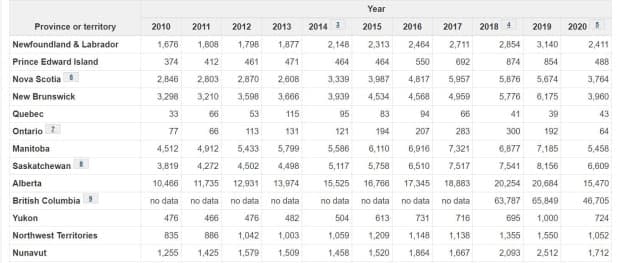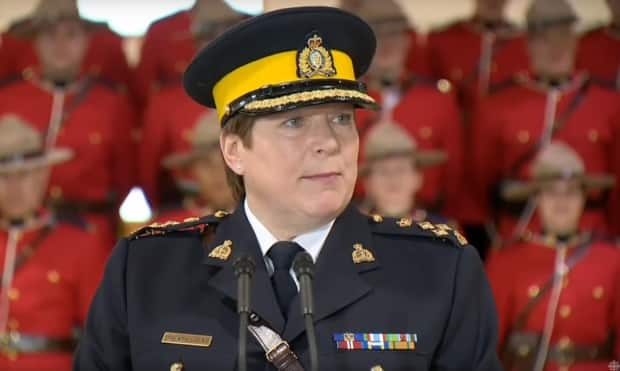RCMP says members have responded to more than 88,000 mental health calls this year
As questions mount about how police officers handle mental health calls, a new RCMP report shows the number of interactions between Mounties and people experiencing mental health crises has increased in most provinces and territories.
Last year, Mounties reported more than 123,000 "mental health occurrences" — the RCMP's term for a police interaction with someone suffering from a mental health crisis — out of the more than three million total calls received. That marks a slight increase over 2018, when the RCMP recorded about 118,323 mental health calls and just under three million calls.
As for 2020, more than 88,460 mental health run-ins were logged in the force's tracking systems between Jan. 1 to Aug. 31 out of the nearly two million total occurrences so far.
The total number of mental health calls received by the RCMP may be even higher, since the data don't capture every interaction police have with individuals suffering from mental illness.
For example, some occurrences may be filed as assaults, weapons complaints, suspicious occurrences or noise complaints caused by someone shouting, says the report.

The report shows an steady increase over the past 10 years in most regions — however, data for British Columbia, which routinely posts the highest number of calls, only became available in 2018.
A spokesperson for the RCMP also said that mental health legislation is established by provinces and territories, meaning reporting requirements vary from jurisdiction to jurisdiction.
"For this reason, the availability of mental health and well-being check occurrence data varies," said Robin Percival in an email.
The report also shows the number of wellness checks has increased or remained consistent in most provinces over the past four year. Well-being checks aren't necessarily related to mental health and can include, for example, a request from a family member to physically confirm the well-being of a loved one who is not responding.
The force said it released the figures "as part of the RCMP's ongoing commitment to transparency."
RCMP under pressure after Levi death
"In many parts of Canada, police officers are often the first responders on scene when someone is experiencing a mental health crisis," said the report.
"Police have a critical role to play when responding and interacting with a person with a mental illness or a person in crisis."
The RCMP — which provides contract policing in all three territories and most provinces — has been under added pressure to explain how it responds to mental health crises since an officer shot and killed Rodney Levi, a member of the Metepenagiag First Nation in New Brunswick, in early June. His death is now under review by an outside police watchdog agency.
That same month, a video emerged as part of a civil lawsuit filed in B.C. Supreme Court showing an RCMP officer in Kelowna dragging a female nursing student down a hallway and stepping on her head after a wellness check at her apartment.
RCMP Commissioner Brenda Lucki has defended her members amid growing calls to reallocate police funding to better fund social services.
"At three o'clock in the morning, when somebody is wielding a knife and they're suffering from a mental health crisis, that is not the time to bring in mental health practitioners," she told members of the House of Commons public safety and national security committee in June. She's set to appear in front of the same committee on Monday.

"They have to be prepared for everything ... Our calls to mental health are growing exponentially."
But those types of incidents have spurred advocates, including representatives of Canada's largest psychiatric facility, to demand officers be removed from the front line response to people in mental health emergencies.
Watchdog flags 'pattern of concern'
The independent watchdog for the RCMPalso has flagged concerns about what its chair calls Mounties' "unreasonable use of force" during mental health wellness calls.
The Civilian Review and Complaints Commission (CRCC) released a report in July pointing to a "general pattern of concern."
"The reason why I chose at the commission to release a public statement is because we were dissatisfied effectively with that, with the fact that recommendations have been made over and over again with respect to wellness checks, and the RCMP does not appear to be listening," said CRCC chair Michelaine Lahaie.
Lahaie said she recommended that Lucki direct her commanding officers to work with the provinces and territories to develop different health care‑led options.
The mental health report, released earlier this week, said the force supports working with mental health professionals.
"The RCMP, like other police agencies, is very supportive of a collaborative approach for people in crisis, and for individuals experiencing symptoms of distress or addiction. Some communities across Canada have mobile mental health support and outreach services, typically in the form of a psychiatric nurse," notes the report.
"The establishment of such joint mental health responses is contingent on resources and support from provincial and municipal health services. Mobile mental health resources are not available in all jurisdictions, leaving RCMP members to deal with these calls unsupported in the vast majority of cases."


